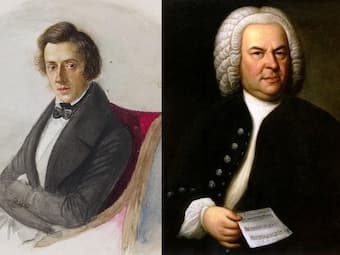
© Delallo
My son is a professional chef who has been working in fine dining in London for 6 years. He lived with me during the UK lockdown, and in addition to enjoying his beautiful, inventive and flavoursome cooking, I learnt some useful ‘kitchen tricks’ and shortcuts from him.
Homemade pasta was something that had eluded me for years. It’s not that I couldn’t make it, it’s that I could never make it ‘right’. But with my son’s guidance, I have now learnt to make my own egg pasta – and I don’t even use a machine to roll it, just a long rolling pin and a dash of elbow grease. The other day I made tortellini (filled pasta) using my own pasta dough. As I was cutting out the discs of dough to be filled with a mushroom stuffing, it occurred to me that if I can make pasta dough and filled pasta, I can also make Japanese gyoza, Chinese wontons and dim sum, Indian samosas, Polish pierogi, and any number of other small stuffed dumpling.

3D image of Chopin by Hadi Karimi
Musical skills, just like culinary skills, once learnt and practiced, can and should be applied to different situations. No learning should ever be done in a vacuum: a single piece of music is not just that one piece, it is a path to other pieces via accrued technical proficiency and artistry. Early students and less advanced pianists often see the pieces they are learning in terms of stand-alone works which have no relevance to other music they are working on, or are going to learn. This is also particularly true of scales, arpeggios and other technical exercises which may be studied in isolation instead of appreciating their relevance not just in understanding keys and key relationships, but also in actual pieces of music. This was something I was not taught when having piano lessons as a child, and it’s the fault of the teacher, not the student, if the usefulness and relevance of technical work is not highlighted.
J.S. Bach: Keyboard Concerto in F Minor, BWV 1056 – II. Largo (Simone Dinnerstein, piano; Berlin Staatskapelle)
Everything is connected. Chopin knew this: it is said that he studied Bach‘s WTC every day, appreciating this music’s relevance to his own musical development, his composing and his teaching. If you can successfully manage Bach’s ornamentation, for example, you should have little difficulty with Chopin’s trills and fioriture.
Frédéric Chopin: Etude No. 8 in F Major, Op. 10, No. 8 (Luiza Borac, piano)

Chopin and Bach © VPR
If we understand how to adapt specific skills, to make them relevant to the repertoire we are currently working on, we can make the learning process less arduous and more rewarding, while also continuing to build on existing skills and develop new ones.
For more of the best in classical music, sign up to our E-Newsletter



